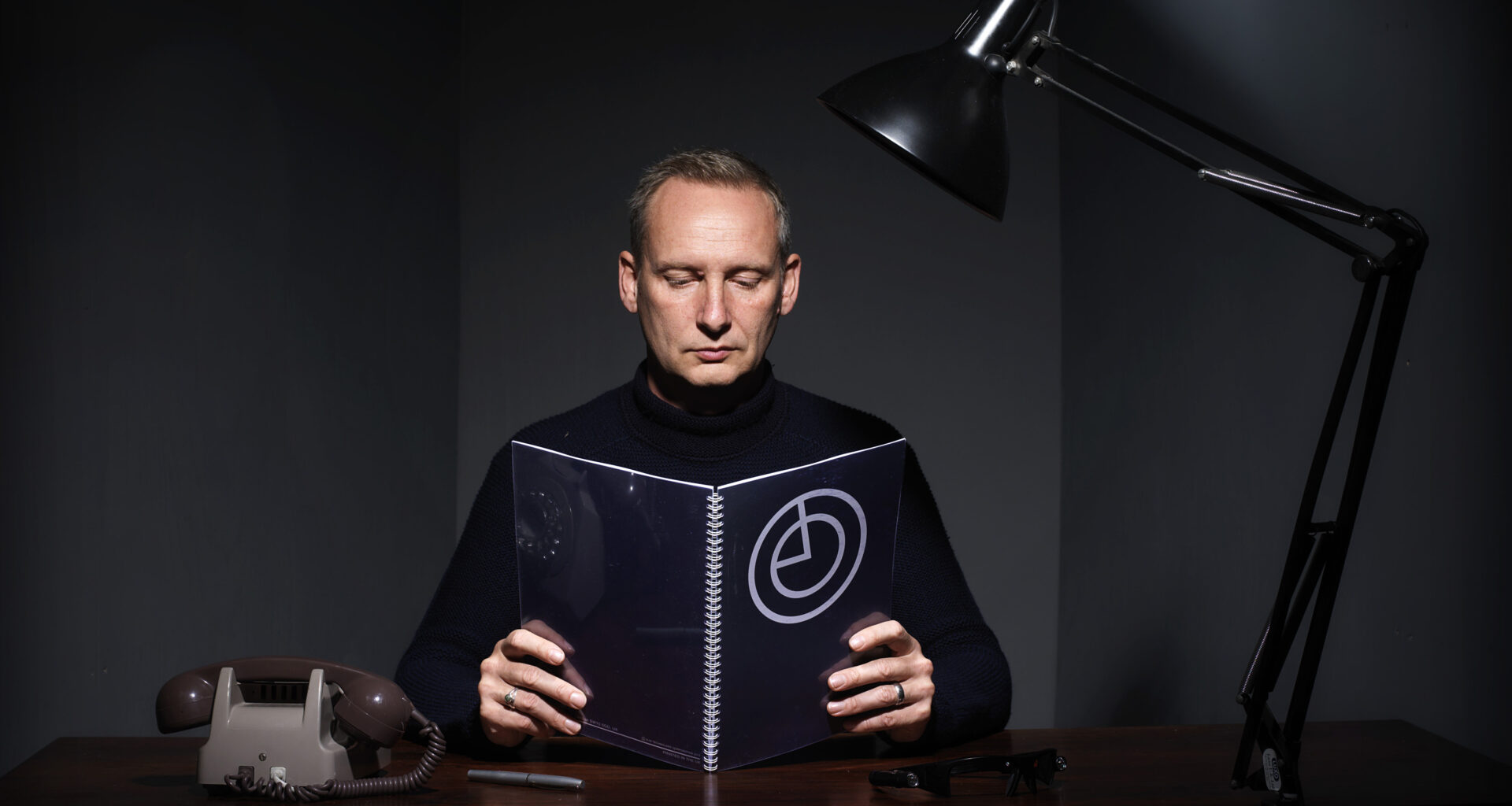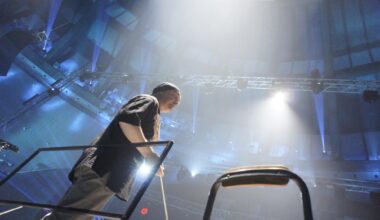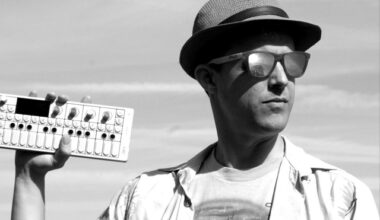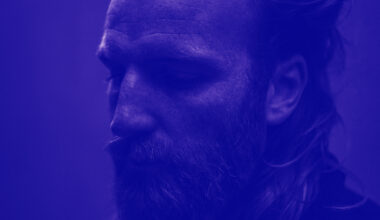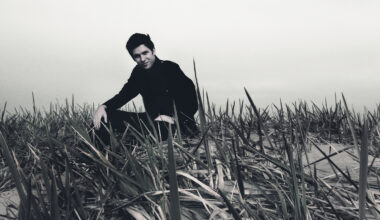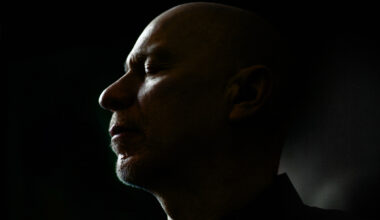Paul Hartnoll, the creative force behind Orbital, is back with a new album under the name 8:58 and it’s all about time. The clock is ticking…
Even a stopped clock is right twice a day. And Paul Hartnoll has seven.
The former Orbital man’s studio, a brain-boggling treasure trove of classic analogue synths and bleeding-edge digital gear, is hidden in plain sight, buried deep in the basement of an outwardly unremarkable building on an industrial estate near Shoreham Docks, much in the same way that the TARDIS masquerades as a police phone box.
Fittingly, the first thing you notice is a huge framed photo of Jon Pertwee’s Third Doctor and his assistant Jo Grant looking down on a platoon of Daleks. The second thing you notice is that Paul Hartnoll really likes to know what time it is. Or rather, what time it isn’t. The room’s white walls are home to a wide array of timepieces representing various eras of post-war household kitsch. Only Flavor Flav has a bigger collection.
But where Flav’s dial is often set at two minutes to midnight, symbolising an oncoming crisis or apocalypse, Paul’s are all set at two minutes to nine. Or, as the name of his new recording alias has it, 8:58. A time of day which is filled with significance for Paul.
“It’s a big obsession,” he explains. “It goes back to before Orbital and it’s probably what I should have called Orbital in the first place. It’s something I’ve always identified with. I used to draw a little clock at two minutes to nine on my hand… You can still see the ink. I associate that time with when, as a petulant youth, I walked away from jobs I didn’t like, like stacking shelves in Tesco or packing meat in a factory. It’s the time when you get to the factory gates and think, ‘What am I doing? Fuck off. Nah, I’m off’.
“Whenever I’ve walked away, it’s been so empowering. It’s like walking away from a bad relationship or something. So 8:58 is when you readjust your path after you’ve gone off-kilter. It’s that moment of choice. I’m not criticising anyone who works in a factory or an office, whatever floats your boat is what you should do, but it’s about realising you’re doing the wrong thing and doing something about it.”
What happened to bring that feeling back to the forefront of your mind?
“Making the decision to leave behind Orbital and my brother,” says Paul. “It’s walking away from something that was safe. I’ve got this big brand – Orbital can headline festivals all over the world – but I can barely get a gig at the moment as 8:58. But I feel like I’m doing the right thing. I’m happier for it. Hopefully it’ll build up again once everyone twigs…
“The album I’m putting out as 8:58 is the album people would have got anyway, pretty much, give or take my brother’s opinion. I’ve always been the writer of Orbital. Phil’s done a few good riffs along the way, but he’s been more of a sounding board. That’s no small thing, it can be an important part of the process, but it wasn’t working any more, on lots of different levels. It had to stop. I wasn’t happy and I wasn’t feeling creative.”
You’ve already put out an album as Paul Hartnoll (2007’s orchestral-based ‘The Ideal Condition’), so why the change to a band identity?
“I saw my name on a T-shirt and it looked horrible!” he says. “But it’s also the smoke-and-mirrors and the magic of creating a new brand identity. It just feels more exciting. Calling it 8:58 leaves it open so that in future there could be two of us on stage, or four of us, and that way it won’t look like ‘Paul Hartnoll and his minions’.
“I also wanted this to have a strong identity. Orbital grew a really strong identity and I didn’t want to stray too far from that. With my solo album, I was trying to do something different with an orchestra, whereas 8:58 is really what I was doing anyway. I haven’t deviated from Orbital’s path just because I’m not working with my brother. I’m doing what I felt I was going to do anyway, but possibly with a few more singers because I enjoy collaborating with other people.”
Produced by Flood and with star turns from the likes of Robert Smith, The Unthanks and Cillian Murphy, 8:58’s self-titled album is themed around time. A monologue by Cillian Murphy, which crops up a couple of times, speaks of escaping “time’s tyranny” and imagines “a watchless world”. Is that a cheeky throwback to the “time becomes a loop” sample featured on the first two Orbital albums?
“I’ve always been obsessed with time, so inevitably it’s a subject that comes up over and over again,” Paul Hartnoll explains. “I suppose it’s because I work in a time-based medium. You can’t shuffle past music in a gallery at your own pace. Music flows in slices, at the same speed as life, and all you’re doing is playing with sound-pulses over time.
“It’s a weird, abstract concept, music. I was going to call the ‘Wonky’ album [Orbital’s 2012 swansong], ‘One Big Moment’ because I had this overwhelming sense of life not being divided into days. I was like, ‘Shit, it’s just one big thing’. I visualised life as this rocket going off into the stratosphere and bits fall off as you age. But we did it by committee, so ‘Wonky’ it was.”
Orbital’s first single, the immortal rave anthem ‘Chime’, was famously made on the Hartnolls’ dad’s tape deck. Paul had a job at a pizza parlour in Sevenoaks at the time (which he had to quit to do ‘Top Of The Pops’). To go from those lo-fi origins to an era when anyone can get pro-level editing software on their mobile phone must be mindblowing.
“I don’t think it matters,” he argues. “You can hand anyone a guitar, but only a guitarist can play it. I’m grateful for these tools being available now, because when I was 14, 15, 16, watching school science programmes, you’d have these bits where people like Midge Ure or Peter Gabriel would pop up with a Fairlight sampler and I’d think, ‘Oh my God, I want one of them’, but they were 30 grand. They were unobtainable, like most synthesisers.
“Later on, when l was in a local psychedelic band, one of the guys had a [Roland] SH-101, a really cheap version of a synth, and it was brilliant. From then on, the prices started dropping and dropping, and as the digital stuff hit the streets the pro users sold their old analogue gear, so people like me would go around sweeping it up for next to nothing. It used to be practically given away because nobody wanted it. That then became the sound of Chicago house and Detroit techno, because all these people could buy cheap drum machines.
“Certainly, that’s what happened to me. Everything I bought was the budget version. Instead of the [Yamaha] DX7, I bought the cheaper DX100, which contains lots of the famous house and techno sounds. And the [Roland] 909 was the cheapest of the drum machines because it wasn’t digital. Along with the 808, it’s now the premium sound of house music. More so than the 808, really. The 808’s more hip hop.”
Are limitations, as opposed to a complete carte blanche, a positive thing for creativity?
“Totally,” agrees Paul. “This is ridiculous, what I’ve got in here. It’s only because I show restraint and have discipline that I can get anything done. I’ve just started a new project and I looked around the room and picked my team. This, this, this, that, those two. Nothing else is turned on or plugged in. But inside my laptop is a black hole of software that never ends. You’ve got to have your ideas and then realise them, rather than floundering around in a sea of presets and options.”
In contrast to certain plug-in-and-play merchants on the rave scene, Orbital were known to use improvisation on stage. Does that continue with 8:58?
“Yeah, this is my current live set-up and it’s based on improvisation,” he says, gesturing towards a long wooden trestle table covered in equipment. “Because I’m a new artist starting out, I can’t take around the huge amount of analogue gear and drum machines that I did as Orbital, so I’ve picked two high-quality generals. The polysynth there, the [Access] Virus, can do everything, and I’ve also got a really good analogue synth next to it.
“But my improvisational weapons are the iPads at the front there. In the computer, I’ve got all the clips, tiny sequences to run. It took me three months to break everything down. It’s set up more like the old-fashioned way, when I had [Alesis] MMT-8 sequencers with eight buttons along the front, and you’d just turn them on and off to change the patterns. I’ve just done my first gig like this and I really enjoyed it.”
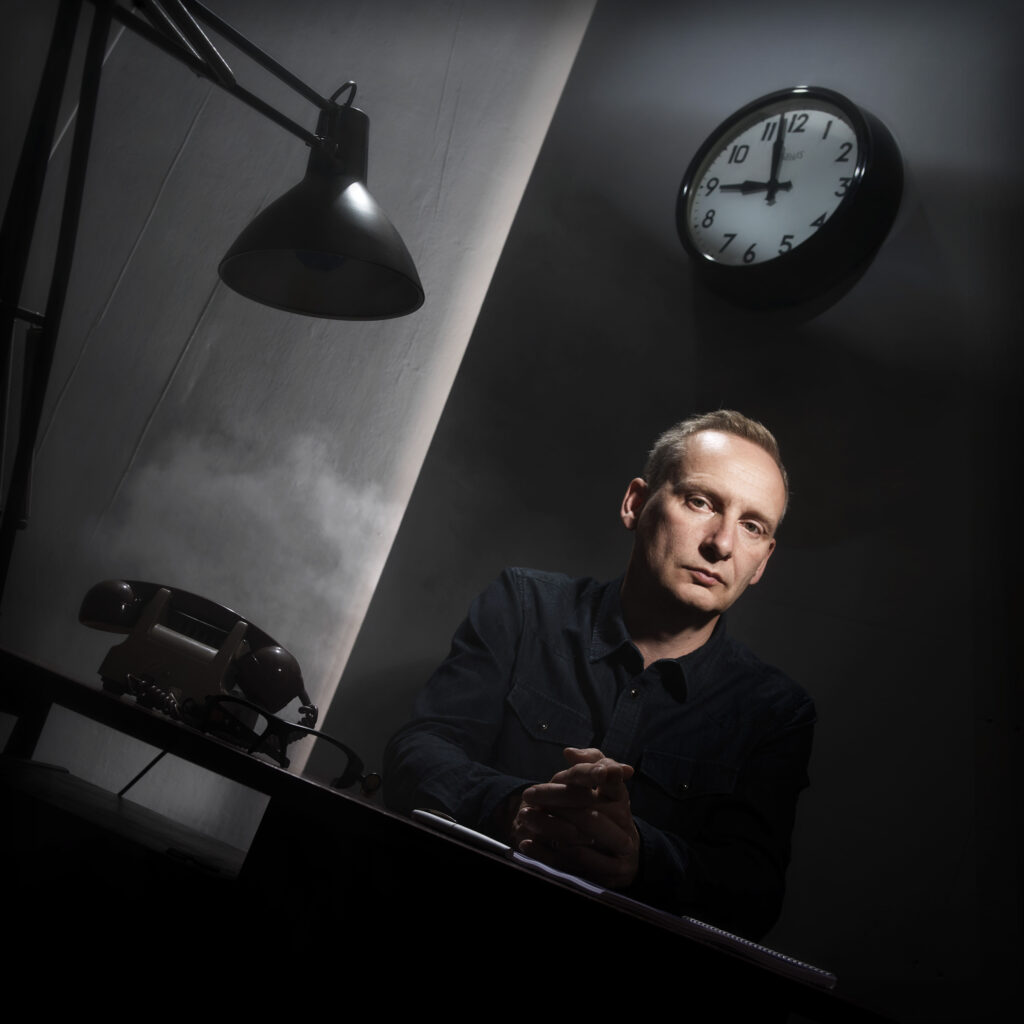
So when you and Phil used to run around the stage with your torch glasses on, twiddling knobs and faders, that wasn’t just showmanship?
“Oh Jesus, no,” he exclaims. “See, what I loved doing was using this thing, this Macbeth M5N synthesiser. There’s no MIDI, no presets, so whatever those knobs are doing is what you hear. It might start off doing the bassline, but then on the next track it would be a lead line, so I had to get it from ‘bob-bob-bob-bob’ to ‘wee-oo-wee-ooh’ and I had to do it live so I had to learn it inside out. Sometimes I’d keep the sounds going, but change the sequence so it was, ‘Ahh, it’s fallen into that’. Great fun.”
Last October, an announcement that Orbital were “hanging up their iconic torch glasses for the last time” appeared on the band’s official website.
“Yeah, I wished I hadn’t said that,” Paul smiles. “Someone came to see me live recently and I was wearing the glasses, and they pointed it out on Twitter… ‘Not quite hanging up the torch glasses, then!’. We actually sold them as merch on the last tour. I was against it, but Phil insisted. I thought, ‘You can wear a T-shirt anywhere, but where are you gonna wear torch glasses? When you go to the loo at night? Camping, maybe?’. They didn’t sell well. I’ve got boxes of torch glasses in my manager’s office.”
Given that the last burst of Orbital reunion activity ran from 2009 until 2012, ending a full two years before the announcement, what prompted the timing?
“It was because I was getting ready to start as 8:58 so I didn’t want people to think… I hate that phrase ‘side project’. It indicates that it’s not as important or just something I’m doing while I’m waiting for someone. I want to make it clear that this is what I’m doing now instead of Orbital. This is fulfilling the creative joy I got from Orbital. I’m already planning the next 8:58 album. I actually finished this one a year ago, but then Flood and I got the score to ‘Peaky Blinders’ [the BBC TV series], so we spent all last summer and autumn doing that.”
You also quoted James Bond on the website announcement – ‘Never Say Never Again’.
“No, my brother did,” says Paul. “He insisted on saying that. I said, ‘Don’t say that, it’s not true’. There is no ‘again’. The 2009 reunion was the ‘again’. We finished before, then we got back together, so it would be embarrassing to do it again. The problems that were there before hadn’t gone away, as promised, so I said ‘Enough’.”
You’ve left a whole generation with memories, though. Particularly at Glastonbury, where you seemed to headline the second stage almost every other year for a whole decade. What are your own memories of those shows?
“The first one in 1994 was really the best one… Immense, unbelievable. I’d never been on a stage that big. Looking out at the crowd was like a scene from the ‘Lord Of The Rings’ films. Did I enjoy it? About halfway through, I thought, ‘If it all goes wrong now, well, we’re halfway through’. By the time we hit ‘Chime’, I thought, ‘Brilliant, we’ve done it’. It’s one of only two gigs where I’ve thrown up beforehand from nerves. That and playing New York for the first time.
“They’ve all been good at Glastonbury, though. The last one, with Matt Smith, was hilarious. If you can pull off something like that, where you know people are monged and it’s a bit trippy and psychedelic, and then you pull Doctor Who onstage… You know it’s gonna be like, ‘Noooo!’.”
In between albums, Paul has been busy as a composer for film and television (including ‘Event Horizon’, ‘The Saint’, ‘The Beach’, ‘xXx’ and ‘Pusher’, as well as the aforementioned ‘Peaky Blinders’) and for adverts (including Range Rover, Rolex, Ralph Lauren and the NSPCC). He views the challenge of working to someone else’s commission as “a sharpening of the tools”, dragging him from his comfort zone and forcing him to work under “creative bondage”. A Volkswagen ad, featuring music made from samples of a real VW, being a good example.
“That was one of the most creative things I’ve been paid to do. I ended up stood in a field in South Africa recording the sounds from a car, getting them to rev the engine to the pitch
I needed. And after doing ‘Peaky Blinders’, which used samples of ‘real world’ sounds, I really wanted to get back into electronics with 8:58.”
Paul’s rate of creativity seems, if anything, to be speeding up rather than slowing down.
“Time’s running out, I’m 46, y’know?” he laughs. “I don’t procrastinate as much any more. I just get on with it. The older you get, the better you get. If you truly love and enjoy your art, you just keep developing. The ideas don’t stop coming. And if they do, I go on holiday. Then the ideas come flooding back.”
The clocks on the studio wall may be frozen in time. But the one inside Paul Hartnoll’s head never stops ticking.
Passengers On The 8:58
The Unthanks (‘A Forest’)
“I’ve liked them since ‘The Bairns’ album, when they were Rachel Unthank & The Winterset. I don’t like the dancey, fiddly-diddly side of folk music, it’s not for me unless I’m drunk in an Irish pub, but The Unthanks are right down my street. So melancholy and dour. I’ve always been aware they tend to do covers and traditional folk songs, albeit in a new style. So I was listening to their song ‘I Wish’ and a lightbulb went on: ‘A Forest’ by The Cure, but in that style, slowed down.
“I visited The Unthanks in their studio, which is next to their house in a barn in a field in the middle of nowhere with bunting hanging up and these old instruments on the wall. Very David Lynch. They said, ‘Shall we show you what we’ve got?’, and I was expecting a CD, but they sat cross-legged on the floor of their parlour, got out their lyric books, which had pictures of trees entwined around the pages, and just started singing in these low voices. And it was just… Oh God!”
Robert Smith (‘Please’)
“‘Please’ comes from my solo album. I did a dance version of the same track that I really liked, but couldn’t quite nail it. I put out 200 vinyl promos, no fuss, and forgot about it. Then when I was doing this album, I came across a demo version that was much better than the one I put out. When I played it to Flood he said, ‘You’ve gotta do that’. I said, ‘Even though it’s a version of something from the last album?’. He said, ‘Doesn’t matter. Go for it’.
“I’d met Robert at a festival in Scandinavia. We always seemed to end up on the same stage, with The Cure playing and Orbital being the disco afterwards. They had all these yurts backstage and I saw Robert peeping in through the crack of our yurt holding a bottle of Pernod and a bottle of blackcurrant. So I ushered him in and we sat there and got drunk. I loved ‘A Forest’ and those early Cure albums. I remember seeing them at Glastonbury, when Robert came on with a big wig and then took it off to reveal he had short hair, and everyone went, ‘WOAH!’.”
Lianne Hall (‘Please’)
“She’s a Brighton girl. I did an album with her ages ago that didn’t get released, but she took it to Berlin, tinkered with it with some other people, and it finally came out under the name Haunted House. Originally, when Robert Smith gave me the vocal to ‘Please’, he said, ‘There’s a girl part as well’, and he’d done the most hilarious pitch-shifted version of his vocal to illustrate the girl part. Lianne had the right kind of swagger to match Robert, I felt.”
Fable (‘Cemetery’)
“Fable’s manager Andy organises a get-together for musicians in Brighton and he said I should give her a try. I listened to some YouTube clips and, wow, she’s got an amazing voice. She came in with the bones of an idea, lyrically and melodically, and she had some great little hooks in there, although I asked her to change it to make it more about the passage of time. It’s got a sort of woodland, pre-Christian versus Christian thing going on, with elements of ‘The Wicker Man’.”
Lisa Knapp (‘The Past Now’)
“When I stayed with The Unthanks, they put on the Lisa Knapp album when we were having breakfast the next day. It’s from that same folk world. Very forward thinking. When I got home, I bought her album, ‘Hidden Seam’. She’s part of what I think of as the witchy mid-section of ‘8:58’, which doesn’t have anything to do with time, but for me it fits in beautifully. It’s a kind of folklore element and it makes me think of the struggle that women had years ago, when they had no power so they’d literally be burned at the stake for attempting to get any.”
Cillian Murphy (‘8:58’ and ‘The Clock’)
“I wanted an actor, someone who’s got a bit of gravitas to their voice, for the intro to the album. Flood’s a good mate of Cillian’s – they’re school run dads – and he suggested him. Cillian was filming ‘Peaky Blinders’ at the time and we were getting on board to do the score. We gave Cillian the script for the intro, he did it into his phone during downtime, and that mp3 was the performance. I had a track I couldn’t finish, just a bassline and a drum beat, and I thought, ‘I wonder if Cillian’s the missing ingredient?’, so I chopped the mp3 up and sampled it over the top, which ended up being ‘The Clock’, the single, and also the title track. Two songs for the price of one. I don’t have a problem doing that kind of thing. I like repetition.”
Ed Harcourt (‘Villain’)
“We go way back. I was asked to judge the Ivor Novello Awards and Ed was also on the panel. We just clicked. It turned out he’s friends with Flood, so when I needed a male vocal I thought of him. It was a proper collaborative affair. He came up with something and me and Flood loved the chorus, but for the verse we thought it should be something like the Witchfinder General wringing his hands, sat in his little cottage, wondering in worry and shame, ‘Should I be burning these women? Am I doing the right thing? Help me, God!’. When we put that to Ed, he ran away with it and rewrote the lyrics to match that idea.”
‘8:58’ is out on ACP Recordings
